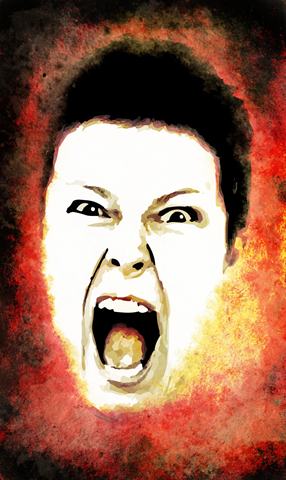Throughout history, all sorts of violence has troubled our human culture. According to recent research, violence and physiology (our body not our mind) may be more tightly linked than initially thought. The tendency to be violent is (so it seems) written right into our DNA.

Pixabay
It’s obvious to most of us that violence can be a cause of physiological stress and trauma. But it’s also possible that our physiological characteristics are sometimes the source of violence. In other words, our bodies make us do it. But how, and why?
Well, to start with I started looking at what is violence? I looked at definitions in dictionaries and also the World Health Organization, or WHO. According to them:
Violence is the intentional use of physical force or power, threatened or actual, against oneself, another person, or against a group or community that either results in or has a high likelihood of resulting in injury, death, psychological harm, maldevelopment, or deprivation. source
The article PDF from WHO focuses on psychology and physiology, and to aim to identify what attributes predispose an individual to violent behaviour. I wanted to glean out the physiological aspects and there’s not a lot of research about that which is easily available, but there is some.
Many reports, trials and tests consider social and psychological factors – an abused child is likely to abuse people in adult life etc. However, not everyone exposed to risk factors exhibits violence. And not every violent offender has history rife with environmental risk. So how do we explain this? Is there a deeply rooted, physiological component to violent inclinations as opposed to external factors? I.E. can it be nature not nurture? Well, the answer appears to be YES.

STREET FIGHT (source)
To determine what accounts for different outcomes between people who went through similar social lifetimes, I wanted to look at the neurological and physiological research, but I’m no scientists so this was tough going.
However, I came up with this...
On the physiological side of things, scientists have examined the differences in nervous systems between individuals to investigate violent behaviour. Neurological studies indicate that all of our nervous systems can widely differ in how they process, recall, and react to events, information, and situations (tell me something I didn’t know). So, how we are wired can heavily influence our reactions to certain HORMONAL reactions within our bodies. I guess the now infamous women who suffer from menstrual hormone imbalance can be a good example. Normally pleasant, well adjusted females turn into violent raging bulls (not all of us but some do).
So, this is hormonal violence. A kicking would still hurt though, regardless of cause. However, it can work the other way. The nervous system can trigger the hormone rush that excites us to a frenzy, and in some cases this manifests as a violent act. (see below for more on that)
But this was new to me
According to a recent study published in The International Journal of Epidemiology, a person’s resting heart rate may affect their inclination towards violence, especially in young subjects.
Joseph Murray, an academic at the University of Cambridge, worked on a study which measured the resting heart rate of 3,000 male and female children, monitoring them from early childhood to young adulthood.
His team found that men (age 18/19) with a lower resting heart rate averaging around 59-65 beats per minute were between one-and-a-half-times and two-times more likely to have committed violent acts, even after controlling for several other (environmental) variables. Women with a lower resting heart rate were twice as likely to have committed violent crimes than women with a higher resting heart rate.
Some suggestions were that lower resting heart rate causes either displeasure, fearlessness, or under – stimulation, all of which may result in either anti-social behaviour or “thrill chasing”.
From my point of view that would link into my knowledge of the ‘fight or flight’ and adrenaline rush syndrome I have posted about previously. If the body ‘feels’ it’s unhappy or at risk, maybe a mild flash of the fight or flight response kicks in and thus stimulates the aggression, as there’s nothing to actually fight. This could then result in non-psychological, but very physical violence as the person ‘let’s off steam’ into the face of the nearest poor soul who gets in the way.
The nervous reaction
Scientists also believe that neurological factors relate to aggressive behaviours. Of the neurotransmitters known to scientists, four are thought to relate in some way to aggression in either animals or humans. These are dopamine, norepinephrine, serotonin, and GABA.
Research has shown that animals may be “rewarded” by the brain following violent acts with a rush of dopamine, the chemical which causes pleasure. That has also been suggested in people who self-harm. They hurt themselves and get a rush of the good stuff, making them feel a little better. Even though we consider ourselves ‘evolved’ above animal status I wonder if our bodies do not.
Serotonin is a specific neurotransmitter heavily studied in connection with aggression and violence. Interestingly, a body of research shows that in many nonhuman animal species, individuals prone to repeated aggressive or violent behaviour undergo marked changes in brain activity related to serotonin.
There’s a lot of research out there and I would be here for weeks writing about it all, so I’ve posted some links at the end.
The thing is, that in looking at the subject from a variety of angles, from the fight or flight reflex, to the fact that we may or may not have evolved hands (and faces) to specifically cope with better punching, through to the fact that various pain/pleasure hormones are related to a committed act of violence, I feel there’s so much more to this than the way we’re brought up. There’s a lot less research that has focused on the somewhat controversial topic of hereditary predisposition, but what research exists does suggests that nervous system and neurological factors may impact predisposition to aggression.
In other words, some people may ‘have to be violent’ as it’s in their DNA. If they are not well taught to fit in socially and express anger and frustration etc. in acceptable ways, or the urge to be violent outweighs the need for acceptable behaviour, then the person ‘has’ to act.
Human beings are complex creatures and so consideration between environment AND physiology should be accounted for. A wholistic view rather that a simple "he was beaten as a child, so he will beat his child" psychological attitude.
Next, I might look at why children that have tantrums hit out, and why some don’t.
References
http://www.who.int/violenceprevention/approach/definition/en/
https://www.nap.edu/read/1861/chapter/7#103
https://en.oxforddictionaries.com
https://www.simplypsychology.org/stress-biology.html
https://digest.bps.org.uk/2016/03/07/this-one-physiological-measure-has-a-surprisingly-strong-link-with-mens-and-womens-propensity-for-violence/
https://geneticliteracyproject.org/2016/07/29/does-the-human-warrior-gene-make-violent-criminals-and-what-should-society-do/


Good job excellent friend information thank you for sharing support me with a vote
Hello there @suzanrs :) I really enjoyed reading this article, and found the study about the correlation between resting heart rate and violent acts particularity interesting! I am already looking forward to what you will be discussing with us on your post about children's tantrums :)
All the best.
Thanks you @abigail-dantes - I have to admit that was a surprise to me but reading the information I could see some logic behind the reasoning, and the trial was a long one so v interesting. I will be posting tantrums etc early next week. Again, some interesting research and information. I love learning....
Hi @suzanrs!
Your post was upvoted by utopian.io in cooperation with steemstem - supporting knowledge, innovation and technological advancement on the Steem Blockchain.
Contribute to Open Source with utopian.io
Learn how to contribute on our website and join the new open source economy.
Want to chat? Join the Utopian Community on Discord https://discord.gg/h52nFrV
As a follower of @followforupvotes this post has been randomly selected and upvoted! Enjoy your upvote and have a great day!
We can't take away the self from ourself, it's just the way we areVery insightful post I'd say @suzanrs
That indeed was the thing I was looking at. It's so easy to 'blame' everything else, but never explained to me why someone who had grown up in a totally negative environment could be a gentle soul and someone who was nurtured in a loving environment would be an absolute bastard. These are 'not the norm' cases but still, it happens. I think in such a complex world we can forget that sometimes it's just how we have evolved - or not as the case may be :)
Thank you so much for reading and supporting my post.
I've heard that studies found the abused kids are more likely to be criminals in adult life. They are involved in criminal acts like robbery and even murder.
Nice write up, @suzanrs.
I know from experience that an abused child is likely to 'rebel' against society in one form or another - and yes, many do go on to commit criminal offences. But there are a lot who become rebellious in a 'gentler' way. Abuse does not automatically induce violent tendencies, the same as love and care does not always result in kindness. I'm glad you found my post interesting/useful. :)Thank you @ied
Thts true indeed. Not every abuse creates violence tendency, not every love creates kindness. :)
One longitudinal study showed that some boys were just naturally aggressive. What you said is true sometimes, but environment really matters in changing the trajectory of an individual. A few other studies I've seen did show a very strong link between abuse and the likelihood of criminality. Unfortunately there are very high rates of abuse among foster children, so among other reasons that cohort typically does not find much success in life and is often destined to get caught in the juvi into prison system, hopefully this can change and the care system can be reworked and punishment can also be changed to actually help improve individuals instead of punish them, but good family really matters.
The point I was hoping to find, and I think I did, is that no one thing makes or unmakes a kind or a violent person. Environment, single incidents, genetics, physiology - all play a part. The main aim for this post is to show that even with wonderful environments and kind support and person with specific tendencies 'can' be violent and the opposite could also be true.
I see, it does indeed happen sometimes.
Nice post, it actually got me thinking. Neuroscience and molecular studies has not really dealt with the subject matter from this perspective. I'll be look forward to your next post on children with tantrums.
Thank you for your support @herbayomi -
And so will I! LOL Where to begin?
I'm glad it got you thinking - as that is goal achieved - at least once :)
lol... okay, I hereby declare you a scientist!
So, go ahead. I'll follow you so I can get the anticipated post firsthand
@herbayomi Tantrums is now live if you want to take a look :) I found researching interesting - you may find info interesting and we're all happy :)
When I got to
I actually paused and tried to count my heartbeat. Lol. Interesting facts you have here.
Well @dandymee Are you off to bash the poop out of anyone anytime soon or not? lol. The heart rate wasnt any aspect I had never considered until reading the information. Glad you liked it. :)
Everything we do is cause and effect even to the most voluntary actions but for our survival we have seen it fit to live by a set of rules and we have to adapt to those rules no matter what nothing is good or bad we let the rules decide